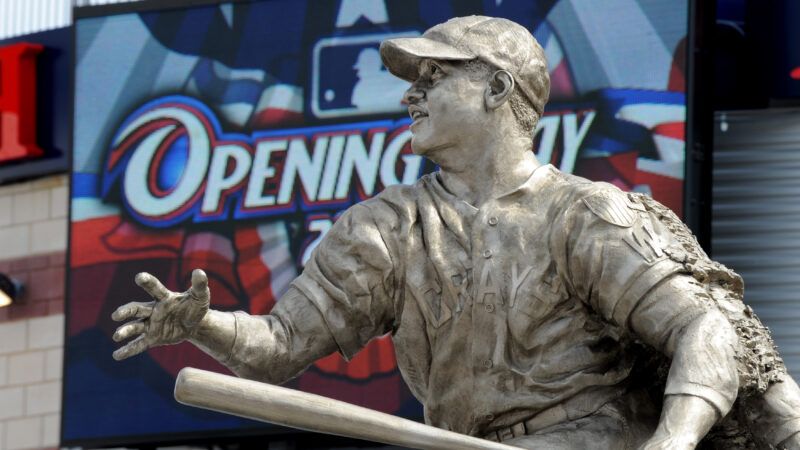Baseball's Awkward Attempt at Making Amends for Its History of Segregation
Is Josh Gibson the best hitter in major league history? Sadly, we'll never know, no matter what the record books say.

Josh Gibson died in January 1947, a little more than three months before Jackie Robinson broke professional baseball's so-called "color barrier."
Despite never playing a single inning in the two leagues that comprise Major League Baseball (MLB), Gibson is now officially recognized as the player with the best career batting average in MLB history: He hit .372 during his years in the Negro Leagues, a few points higher than Ty Cobb's career average of .367, the previously recognized top mark.
It's a somewhat incoherent idea to have Gibson on top of the batting average charts, but that's the awkward result of the MLB's decision earlier this year to officially elevate the Negro Leagues—a collection of various circuits that existed in the first half of the 20th century, when nonwhite players were kept out of the National League and American League—to "major league" status. As a result, Gibson and other stars of the Negro Leagues are now recognized alongside figures like Babe Ruth (who played before the major leagues were integrated) and Hank Aaron (who played after they were).
In announcing that decision, MLB Commissioner Rob Manfred said the goal was "ensuring that future generations of fans have access to the statistics and milestones of all those who made the Negro Leagues possible."
It's a decision that should be understood as an attempt to apply some measure of justice to the sins of professional baseball's racist past, but it's also a decision that underlines the impossibility of fixing some injustices after the fact.
In short, Gibson might deserve to be recognized as the best hitter in baseball history. He was certainly tremendously talented. But what he really deserved was a chance to play against the best players of his generation, regardless of the color of their skin. Nothing can fix that now.
I'm thinking about all this today because MLB is hosting a special game tonight at Rickwood Field in Birmingham, Alabama, which was once the home field for the Birmingham Black Barons, one of the top Negro League teams. Tonight's game is meant to celebrate that complicated chapter of baseball's history—and specifically to celebrate the late Willie Mays, who played in Birmingham before joining the San Francisco Giants.
Celebrating that history is overdue and welcome. So are other celebrations more broadly focused on the end of institutional racism, which the MLB does every year on April 15, the anniversary of Robinson's debut with the Brooklyn Dodgers. Think of it as baseball's version of Juneteenth.
But changing the record books feels a bit different to me. It awkwardly seems like the right thing to do while also muddying the actual history and obscuring the fact that the institution now elevating Gibson (and other pre-integration black stars) is the same institution that once kept them out.
Maybe that's progress, and maybe it's also the best that we can do under the circumstances—and without a time machine.
Still, the dilemma posed by the updated MLB record book reflects the broader difficulty of reckoning with America's racially segregated past. Baseball's experience is a useful thought experiment since it strips away some factors that complicate debates over policies like reparations. No one is being actively harmed by the MLB's rewriting of the record books. No assets are being redistributed.
So why does it feel so unsatisfying?
Part of the answer, I think, is because it seems obviously fake. We don't know what career batting average Gibson would have posted if he'd been allowed to play in an integrated major league. For that matter, we also don't know what batting average Cobb would have recorded or how many home runs Ruth would have hit if they'd faced the best pitchers in the game—instead of only the best white pitchers.
In The Atlantic, Malcolm Ferguson suggests that the only fair way to square that history away would be the creation of separate record books for the MLB's pre- and post-integration years.
That's probably the right answer to the acute issue of baseball records, though of course the MLB as a private institution has the right to include or exclude whatever records it wants. For the record, a post-integration ranking of best hitters in MLB history would have Ted Williams (who was white) in the top spot, with Tony Gywnn (who was black) in second. That's a ranking that few baseball fans would disagree with, and one that reflects the widely held belief that they were the best hitters of their eras.
Unfortunately, resolving other injustices around institutional racism are more difficult than rearranging names on a list. In a broader context, the complexity of baseball's new record book should serve a reminder about why it is so important to oppose injustice in the moment when it is happening—because post hoc attempts at rectifying the past are always going to be incomplete and unfulfilling.
Recognition of the Negro Leagues' statistics isn't truly delivering justice to players like Josh Gibson. We'll never know what kind of career he would have had if institutional racism hadn't robbed him of an opportunity that cannot be restored. It's not fair to fans of baseball either, who were permanently robbed of seeing what he could have accomplished against the best players of all races.


Show Comments (31)